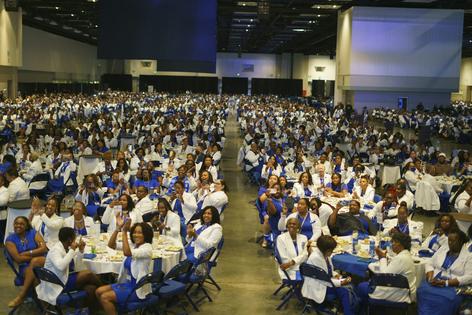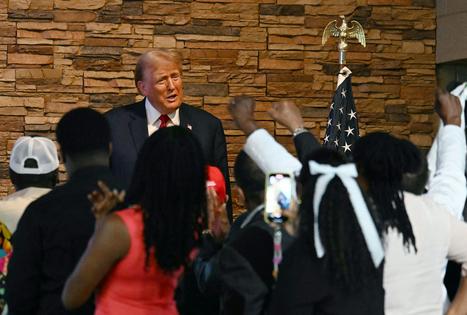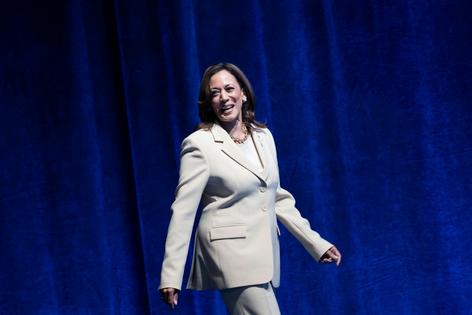Kamala Harris’ message to women on ‘freedom’ helps explain why Black and white Christians are deeply divided over support for Donald Trump
Published in Political News
Just days after President Joe Biden withdrew from the 2024 presidential race in July, Vice President Kamala Harris addressed the annual meeting of the Zeta Phi Beta sorority in Indianapolis, where she emphasized the importance of both religious faith and political freedom.
Harris contrasted her stance on abortion rights with that of former President Donald Trump, stating, “Across our nation, we are witnessing a full-on assault on hard-fought, hard-won freedoms and rights,” Harris said. “And in the face of these attacks, we must continue to stand together in defense of freedom.”
By centering “freedom” in her campaign, Harris invoked a key element of Black identity and spirituality rooted in the historic struggle for liberation by formerly enslaved people. This legacy partly drives an attitudinal divide between Black and white Christians, especially on issues such as abortion and support for Trump.
As political science and religion scholars, we view Harris’ remarks as a subtle reminder to voters that Black religious life in the U.S. has long involved an appeal to people of all faiths to use their beliefs to advance social justice.
Her message stands in sharp contrast to Trump’s conservative allies, who have pushed for restrictions on personal freedoms concerning abortion.
To better understand the relationship between race, religion and support for Trump, we fielded an online, national survey in June 2024 supported by the Public Religion Research Institute, a nonprofit organization that conducts public opinion polls on a variety of topics.
In order to compare the views of white and Black Christians, our sample of nearly 1,500 adults included over 700 participants from each racial group. We asked half the sample to indicate their level of agreement with five statements commonly used to measure Christian nationalist beliefs.
Those items include support for religious-based laws and the belief that the U.S. was conceived as a Christian nation.
We then categorized participants according to whether they agreed with most of the statements (“adherents” and “sympathizers”) or disagreed with most of them (“skeptics” and “rejectors”). Over one-third of both Black and white Christians agreed with most Christian nationalist ideas.
We found that Black Christian nationalists are far less likely to support Trump, however, compared with their white counterparts. Additionally, they do not back far-right policies, like those outlined in Project 2025, the Heritage Foundation’s plan to implement a conservative agenda across the federal government.
These two groups also differ greatly in their evaluation of Trump. Only 17% of Black Christian nationalists expressed a favorable view toward the former president, compared with 49% of white Christian nationalists.
These racial differences are even more pronounced when we examined the attitudes of charismatics – a group of devout Christians who in the late 20th century began emphasizing Pentecostal practices such as divine healing and speaking in tongues, a language of indecipherable sounds believed to be a direct communication with God.
All participants in our survey – 760 white Americans and 734 Black Americans – were asked whether they had personally experienced or witnessed practices of charismatic Christianity. Those include receiving what they believed to be a direct revelation from God.
While only 23% of white Americans in the study were categorized as charismatic, that figure doubled to 51% of Black Americans.
Although prominent white Christian nationalists frequently characterize Trump as “the chosen one,” we found that only 15% of Black charismatics express favorable views of him compared with 52% of white charismatics.
The Black radical tradition, helps explain how Black charismatics can share so much with their white counterparts – even an embrace of Christian nationalism – but diverge when it comes to Trump and abortion.
In its contemporary form, the Black radical tradition is an ideological framework that asks its adherents to actively resist policies that threaten racial equality and bodily autonomy. Abortion rights fit squarely within this political tradition.
According to a 2014 Religious Landscape Survey conducted by the Pew Research Center, the majority of Black Christians say that abortion should be legal. Those Christians include such denominations as Baptists, Presbyterians and Pentecostals who are not affiliated with the Roman Catholic Church.
Over the years, that majority support for abortion among Black Christians has remained stable and mirrors similar support among Black voters overall. In a 2024 Pew Research Center poll, for instance, 73% of Black voters said abortion should be legal.
During her speech before members of the Zeta Phi Beta sorority, Harris said that she understood the difficulty in balancing one’s faith with political resistance. But as she explained:
We, who believe in reproductive freedom, will fight for a woman’s right to choose, because one does not have to abandon their faith or deeply held beliefs to agree that the government should not be telling her what to do!
After Harris accepted Biden’s endorsement, her longtime pastor, Rev. Amos Brown, prayed that Harris would advance her campaign “in the spirit of our ancestors.”
That ancestral spirit includes the Black radical tradition of political resistance – and the ongoing fight for freedom.
This article is republished from The Conversation, a nonprofit, independent news organization bringing you facts and trustworthy analysis to help you make sense of our complex world. It was written by: Youssef Chouhoud, Christopher Newport University; Dara Delgado, Allegheny College; Flavio Rogerio Hickel Jr., Washington College, and Leah Payne, George Fox University
Read more:
Black church leaders brought religion to politics in the ‘60s – but it was dramatically different from today’s white Christian nationalism
Trump’s die-hard support may be explained by one of his most misunderstood character traits – ‘charisma’
Talk of ‘Christian nationalism’ is getting a lot louder – but what does the term really mean?
Youssef Chouhoud receives funding from the Public Religion Research Institute (PRRI). He is affiliated with PRRI as a Public Fellow.
Dara Delgado receives funding from the Public Religion Research Institute (PRRI). She is affiliated with PRRI as a Public Fellow.
Flavio Rogerio Hickel Jr. receives funding from the Public Religion Research Institute (PRRI). He is affiliated with PRRI as a Public Fellow.
Leah Payne works for Public Religion Research Institute (PRRI). She is affiliated with PRRI as a Public Fellow and receives funding from PRRI.




























































Comments